I’ve written previously about King of Dragon Pass, the iOS port of A Sharp’s 1999 PC strategy game, but having now spent significantly more time with the game I wanted to revisit it and tell you a little more.
Thanks to my iPod Touch being a bit fucked and necessitating repeat trips to the Apple store, I’ve played through the game one and two half times. Recently I beat the short version and in the past I’d gotten about halfway there before having to start a new profile and losing all of my progress. As a result I’ve seen quite a lot of the game.
One of the most positive things I can say about King of Dragon Pass is that, despite this, I don’t feel that I’ve even come close to seeing it all.
—
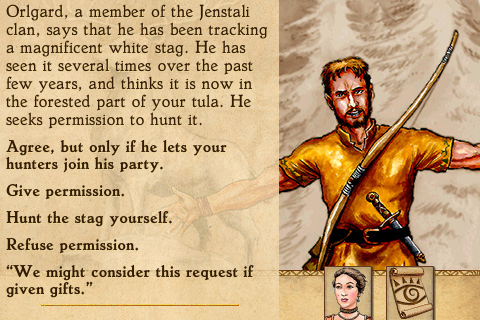
This Is Glorantha
Let’s recap: King of Dragon Pass is a sort-of turn-based sort-of strategy game with sort-of choose your own adventure-style components. It is set in a fictional fantasy world called Glorantha (the setting of the *other*Â HeroQuest) and has you playing the role of an Orlanthi clan ring; essentially the ruling council of a barbarian settlement of (on average) a thousand people.
Each year, over the course of five seasons, you and your clan ring must decide how to respond to a variety of events: many of these randomly occur, and many others are the result of previous decisions or events. For example, if you previously resolved a dispute between two parties by favouring one over the other, the disgruntled party may take actions into their own hands. Or, if your people are stricken by a plague, and conventional efforts to halt it fail – by ‘conventional’ I mean turning to shamans or sacrificing to the goddess of health – then you might try sacrificing to the goddess of disease. This may save your people, but it also commits you to propitiating these sacrifices to prevent the plague recurring and risking the hatred of your neighbours.
As well as these random events you may also choose to raid other clans to plunder their goods and herds, to explore the map around you in search of treasure and secrets, trade and engage diplomatically with other Orlanthi clans, construct temples to the gods and – ultimately – learn the mysteries of the gods and engage in hero quests; efforts to enter the mythical realm and recreate the great stories. Hero quests carry great risks – your named noble characters and ring members can die or be injured – but the rewards can be great, and hero quests open the path towards the end of the game (in the short version, being elected ruler of a tribe containing many clans, and in the long version, being declared ruler of all Dragon Pass).
The game demands that you balance many conflicting demands, weather challenges and pursue wealth and honour in order to lead your clan to greatness. It does not make this easy; you must ensure that your clan can provide enough food for its people, that its cattle herds remain large, that enough dedicated warriors are present to engage in raids and defend your village, and make careful decisions in response to the choices presented you. Sometimes you must be frugal, to support your clan. Sometimes you must be generous, to demonstrate your honour and greatness to other clans. Sometimes you must be prepared to make sacrifices.
Your ability to play the numbers is limited in King of Dragon Pass. No min/max strategy will inevitably see your clan to greatness. The mechanics are occluded beneath layers of choice and consequence; the result is that each clan, each story, is unique. The game recognises this: every significant event, and every choice made, and every consequence, is logged in your clan’s saga. When you complete the game you are asked if you want to email a copy of the saga to yourself. Who could say no?
—
Think like an Orlanthi
The developers have stated that to succeed at the game, players must learn to “think like an Orlanthi”. This does not only mean remaining consistent to the history you choose for your clan at the start of the game – do you hold with the practice of keeping slaves, who are your ancestral enemies, which god did you first revere – but also understanding the Orlanthi way of life.
Behold the first year of the Anmangarn clan. (Do not worry about spoilers. The first year is part tutorial and many of the following events are hard-coded into your first playthrough. )
1330
The alynx spirits chased off the vermin spirits; there would be few rats this year.The Issaries priestess Sora Goodseller came to our clan and asked if we had any white horses to trade. We had no white horses.
Acting as our emissary, Kulbrast asked the Gorinds to make good on the obligation they owed us, and provide us with cattle. Kulbrast asked for no more and no less than the usual amount. The Gorinds gave us the cattle without complaint.
Eonislara, betrothed to Jorator of the Eagle clan, was seduced by Korol, the notorious troublemaking poet of the Heran clan. We went to the Herani and said that we expected Korol to marry her. “You mistake my intentions,†Korol said. “I meant not to eat the whole cake, but merely to sample the dough.†When our people heard this, they were outraged.
We raided the Herani and eluded their patrols. We drove the Herani from the battlefield, and were able to plunder their tula. We celebrated the humbling of lecherous Korol’s clan.
We were raided by the Horse Nomads. Although she was wounded in the attempt, Inganna drove off a group of Horse Nomads who were attempting to circle behind us.
We drove the Horse Nomads off, and their survivors left without plundering our tula.
While exploring our tula, we turned up a cave with green-colored clay that we can use for making high-quality pottery.
Eonislara turned out to be pregnant. Her kinfolk were embarrassed. We left the matter to her kinfolk. People were happy that the ring did not interfere.
The harvest was plentiful.
Orlgandi, a thane of the Heran clan, complained that Bastakos insulted him, and said there would be a feud if we did not punish our trickster. We removed Bastakos from the ring. Orlgandi was pleased by our justice, and the people were happy that Bastakos’s insults would no longer seem to come from the entire clan.
The Boskovi clan offered us 40 cows worth of goods in exchange for telling them our source of green clay. They eventually agreed give us 40 cows for two large wagonloads of clay.
Maniski complained that his wife Enastarra dishonored him by interrupting a duel with Ortossi of the Hillhavens. The clan ring said that Enastarra had Maniski’s best interests at heart. “Tell that to the goose-egg on my head!†Maniski protested. He was told that this was not a matter for the clan ring. The people were happy that the ring was wise enough not to involve itself in a petty dispute. As for Maniski and Ortossi, they eventually clashed again, but neither was skilled enough to do more than wind the other, and they let the matter drop.
As the above saga suggests, clans are constantly engaged in a state of competition that moves fluidly from raiding to trading, from alliance to feuding. Tradition is key – demanding more from another clan than is traditional is considered mean and results in others thinking less of your clan, whereas showering gifts upon guests can be perceived as generous and kingly. Spirits and gods are also powerful figures and far more than mere superstitions; your ancestors’ spirits must be honoured and appeals to the gods are central to any Orlanthi clan.
Another of the most positive things I can say about King of Dragon Pass is how well it holds up its side of the bargain when it comes to thinking like an Orlanthi. The world feels wholly consistent; in how it responds to your actions, in the situations it presents to you, and in how other clans act towards you.
One example of the mindset you must adopt is that you must think first of your clan (and within that, the weaponthanes and landowning farmers and other networks of social bonds), and then of your tribe (if you are part of one), and then of the Orlanthi in general, and then of people who are like the Orlanthi, and last of all those who are different and strange – and thus threatening. Failing to understand your responsibility to your people and traditions will lead to failure; you can chase glory and adventure in Dragon Pass, but you won’t live long enough to enjoy it if you do not temper your ambitions with pragmaticism.
Try to play the game with a mindset of ‘bigger is better’ – as in almost every other strategy game out there – and you will find it necessary to split your clan; it has grown too large and its internal dynamics threaten to tear it apart. Take too much land and your patrols and warriors will struggle to defend it. Construct too many temples and you will not be able to support them all. Establish too many allies and other clans will begin to grumble about your insincerity. Raid the same clans too many times and a feud may be established that could endure for years. These are all things that you can do, and often there are reasons to pursue them, but what is most important is that the clan endures, and this is best achieved by not over-reaching.
—
The world is old and rich in secrets
My other favourite thing about King of Dragon Pass is the sense of mystery it offers. The world of Glorantha is a rich and compelling one; like most fantasy settings it is cobbled together from a mish-mash of other stories and European history (in this case old Nordic tribes). As noted above the game is wholly consistent; the setting, narrative and mechanics complement one another seamlessly and the net benefit this has for worldbuilding and narrative immersion cannot be overstated.
That is a success of the game; the mystery is a wonderful byproduct. Because the game presents events to you with a degree of randomness, and because it is not possible to pursue an optimal strategy that will net you all of the best loot and characters, and because you must always work with the hand that you are dealt, you will never see everything.
To take the random and conditional events, you might ask yourself: what if I had not been unlucky? What if I had chosen differently? Would the outcome have been better, or worse? This questioning of yourself and your decisions feeds wonderfully into the demand that you think like an Orlanthi, and the way that a game can play out so differently from any given point lends King of Dragon Pass a sense of vastness and depth. Then, too, there are all the events that you have not seen: there are many hundreds of possibilities within the game, and many are dependent on a decision you may or may not have made years earlier, or an area of the map you chose to explore.
This leads to another example from my most recent game, which lies within the tula of the Anmangarn clan. Your tula is the land which you have settled. You can send parties to explore your own tula as well as the wider world and this is an advisable strategy, as it can turn up very useful resources to use in trade and crafting. But it is not without risk. Throughout the game I lost over half a dozen parties exploring my tula; it was more dangerous than anywhere else I sent them. And always, many seasons later, others would find their remains, and it was always the same story: only a few scraps of bone and cloth remained, and a chill wind leaps up as the remains are examined, so their discovers beat a hasty retreat.
Something powerful and evil had made its home on my tula and had killed over a hundred warriors, footmen and nobles. I may never learn what it was.
—
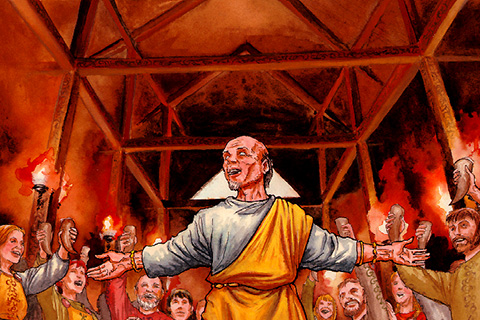
I purchased and played King of Dragon Pass on a whim, curious that a late-90s PC strategy game had been ported to the iOS platform. Imagine my surprise when I found a game of startling depth, that demanded commitment to a moral framework that I did not share, and that bound my choices to strict consequences.
This half-remembered old game, on this platform that is often not taken seriously by ‘core’ gamers, has offered a richer gaming experience than I’ve found in a long time, amongst both major publishers’ titles and the indie games scene. If you’re able to do so, I sincerely recommend that you give it a try.
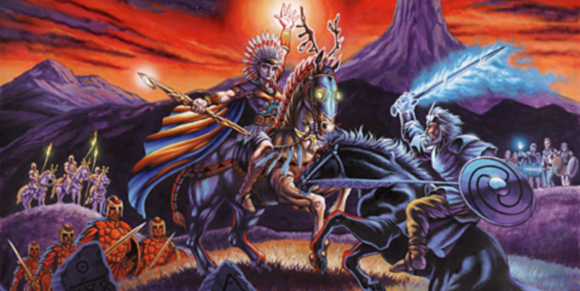
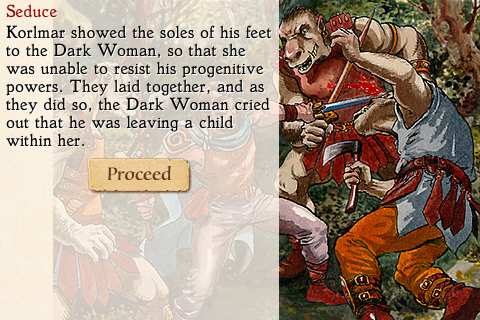
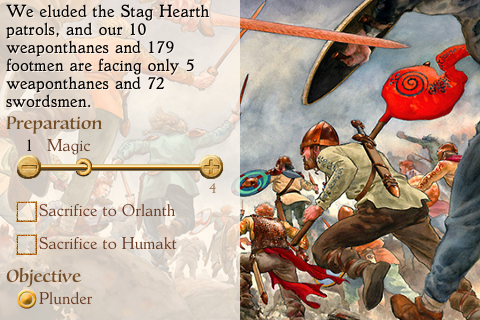
Comments
7 responses to “King of Dragon Pass: Review”
Wish I could, release it on XBLA or PSN and I would definitely give it a go. I don't own any Apple devices nor do I PC game. Nevertheless, that was a fascinating read, combined with the upcoming piece from Spann, we are getting all story-telly aren't we?
Good stuff.
Unfortunately I doubt we'll see it on other platforms. I'm not even sure if it can be re-released on PC – apparently the developers no longer own / have access to the original source code. This confuses me, as I'm not sure how they then managed to release it on iOS, but I'm glad that they did.
We are getting quite story-telling, yeah… I even have a Civ game diary coming up. Man. We need to get some irreverent reviews up in this blog. ;)
Glad you enjoyed this, btw!
Ixnay on the Warf-Fortressday AJ, sheesh…
I only inferred, you're the one who dropped the bomb.
THe problem isn't the source code, it's the development tools they used for the original game. THose are long out of date. Any PC rerelease would require as much work as the iOS version did, at a minimum, and they don't see the effort as worthwhile.
Thanks for the clarification, @zkline!
[…] regular readers will know, not long ago I reviewed King of Dragon Pass (a ported PC strategy/role-playing game from 2001) here on Arcadian Rhythms, […]